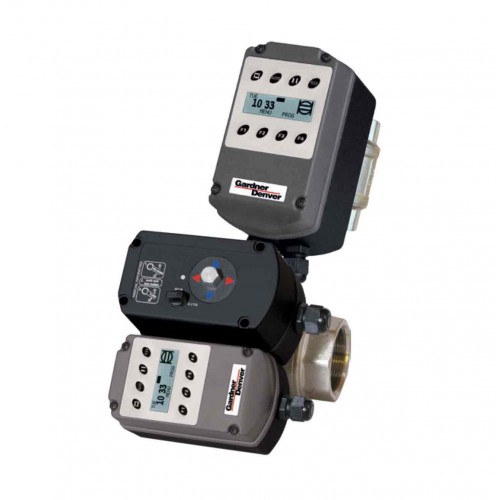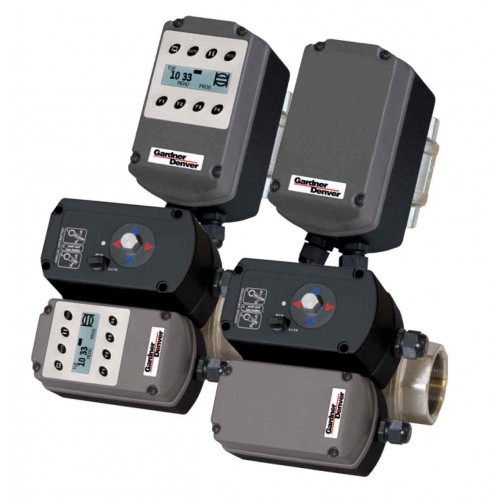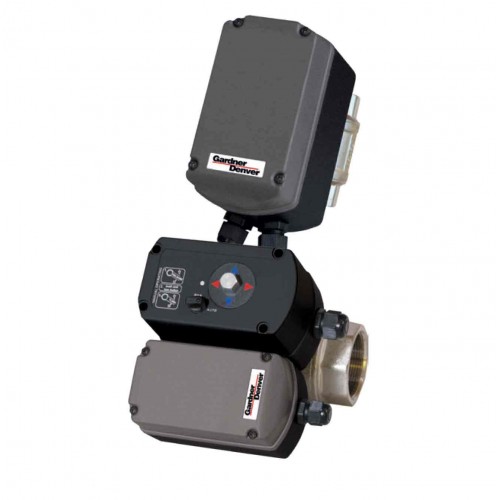Сondensate drain GSLV & GSLVE
Draining the moisture from compressed air systems ensures less downtime and damage due to rust and scale. Gardner Denver drains are designed for long life and require minimum maintenance. They are critical components in the quest for system efficiency and reliability. When a drain fails to discharge the condensate, the condensate can carry over into the system, causing a build-up of contaminants in dryers, receivers and filters. On multiple stage compressors, moisture carryover from the intercooler may allow liquid into the next stage, causing premature wear and a potentially catastrophic failure.
Compressed air energy saver GSLV & GSLVE
A typical compressed air system has air losses through pipe works connections. By installing an GSLV the end user will limit them. Typically installed in the compressed air line after the air receiver.
Product Features
The GSLV has proven its worth and saved millions m3 of compressed air around the world, helping end-users to save valuable compressed air from escaping unnecessarily, reducing compressor running hours and thus extending its lifetime, saving energy and operating costs. The GSLV can be installed in all pipeline systems of 1" or 2". When the ball valve of the GSLV is closed, all compressed air will remain in the air receiver, rather than being lost through leakages. The control module offers programming simplicity and exciting display features
A typical installation example is to connect the GSLV to a light switch. By switching on the lights in the production area - the GSLV will subsequently open. The saved compressed air flows into the factory compressed air line and the compressor kicks-in to produce the air needed to fill the system. At the end of the work-shift you switch off the light(s) and the GSLVE will close accordingly.
Features & Benefits
• No unnecessary compressor start-up during periods when compressed air is not required
• Reduced maintenance requirements and lower power consumption leads to considerable savings on service and energy costs
• Time programmed or remote controlled
• Manual valve opening and closing possible, in case of a power failure
• Typically installed on the air outlet of the air receiver or alternatively applied to close off certain parts of the compressed air system
• A backup battery or a manual valve opening and closing, in case of a power failure
• Battery life indication on the display
• Slow valve opening to avoid "water hammer" in pipe line system
• Brass valve, nickel plated
• Compact design - Easy to install
Technical Data
|
Min./max. system
pressure |
0 - 16 bar |
|
Min./max. medium
temperature |
1 - 100°C (34
- 212°F) |
|
Min./max. ambient
temperature |
1 - 50°C (34 -
122°F) |
|
Supply voltage options |
230 VAC 50/60 Hz. |
|
Power consumption |
Approx.
7W during cycle rotation for GSLV
1" and 9W for GSLV 2". |
|
Enclosure protection rating |
IP54 (NEMA13) |
|
Valve inlet/outlet connections |
1" or 2" |
|
Valve opening/closing duration |
30 sec. (90°) for 1", or 105 sec for 2" |
|
Valve housing
material |
Brass valve,
nickel plated |
|
Illuminated LCD display |
Indicating day,
time, valve status, battery
life |
|
Battery type |
CR2032, 3 volt |
|
Programmable options |
Week planner, max. 100 switching points, to be distributed over
1-7 days |
|
Manual valve
override |
Yes |
|
Remote controllable |
Yes (optional) |


















